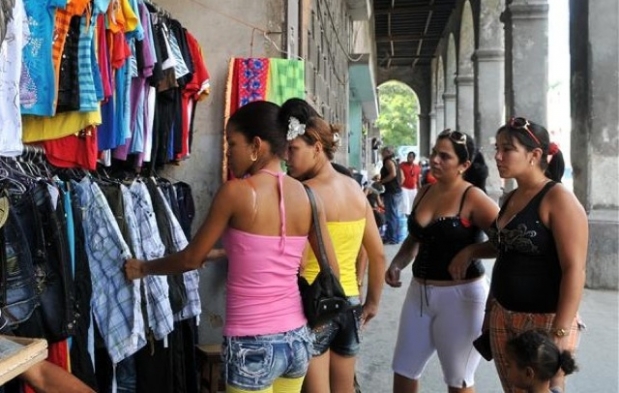
For several days the inspectors of the Ministry of Labor and National Tax Administration Office (ONAT) in the Havana municipality of Cerro have been telling the self-employed workers who sell in the doorways of their homes in the area that they must dismantle their shelves and stands. The only way they can continue doing this work is if they move it inside their homes. And this option is open only to a few, mainly the owners of such dwellings. The rest, who have rented these doorway spaces for their work, will have no option other than to turn in their licenses as self-employed.
But those who can continue to offer their merchandise will not find their future path free of obstacles either. According to what some of these vendors of household items who work on Ayestaran Avenue in Cerro said, the inspectors told them they could not sell foreign clothing nor any article that had been acquired by the self-employed in the State retail market. The only things they will be allowed to sell are items the artisans have made themselves, as self-employed, such as tea towels, tablecloths, handkerchiefs and the like.
That provision makes it clear that the reason for the raid was not only about the public image; that is, to rid the streets and avenues of people crowding around the small traders, a kind of informal economy that proliferates in the cities of almost all of Latin America, and that the Castro regime has tried so hard to avoid.
The other target of this attack — and for some the main one — has been what the authorities classify as “resale.” In other words, the fact that these self-employed offered, at prices higher than the official ones, the same articles that would sell in the State stores, and which in many cases were in short supply in these establishments.
Of course, the higher prices were not due to the greed of the self-employed, but rather because of their not having a wholesale market where they can acquire their goods, so for them the retail price was their costs, and then they had to add a margin for profit to come to their selling price. Ah, but this was never understood by the hard-line Castroites, who wrote many letters to the newspaper Granma asking that these self-employed workers be done away with, calling them “unscrupulous elements who exploit the working people.”
And those who thought this action was confined to Cerro, learned of their error this past Wednesday, May 15. That day, starting early in the morning, a large group of inspectors, accompanied by a police brigade, blocked the doorways on Carlos III Avenue, in the municipality of Central Havana, where there was commercial activity.
A tour we made along that central avenue, in the section between Infanta and Belascoain streets, allowed us to see the magnitude of the repression: Empty stands, racks and shelves; doorways where yesterday life hummed, today mired in the peace of the grave.
This blow against the self-employed operates like a domino effect, not only because many sellers lose their licenses, but also because homeowners lose the rent they charged for the doorways. Thus, a significant group of people who had found a way to sustain themselves, are very likely to become homeless. One lady, who had to close her business, where her two sons sold things in a doorway on Ayestaran Avenue, said, “It seems that the authorities want the young people to have to steal to eat, and then they have a justification to put them in prison.”
And a friend, an economist by profession, who has been well aware of the changes implemented by President Raul Castro, was adamant about the indication of recurrence said, “With these people nothing is certain. It’s one step forward and two steps back.”
Orlando Freire Santana, the author, was born 1959 in Matanzas, Cuba; he has a degree in economics, is an award-winning author of essays and novels, and is an independent journalist reporting from Havana.
Translated from Diario de Cuba
17 May 2013

